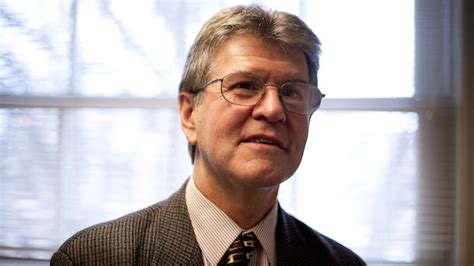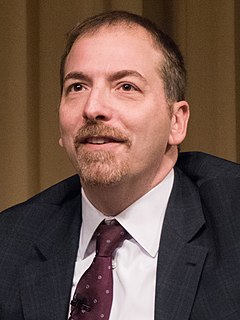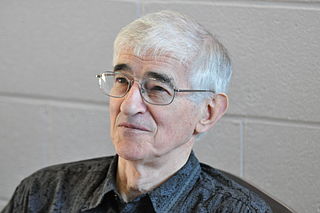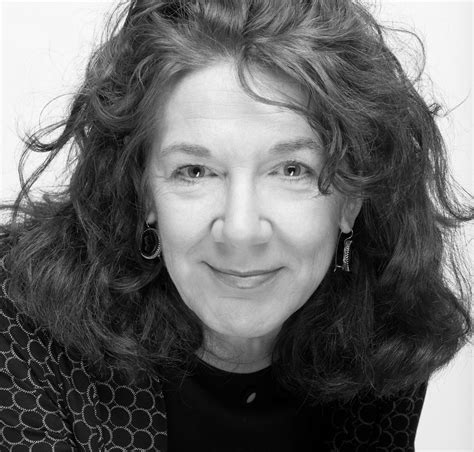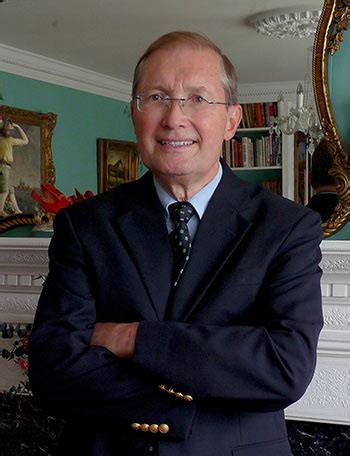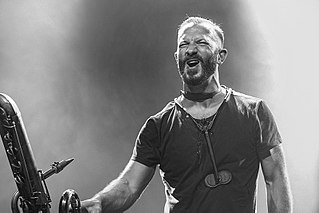Top 158 Apocalyptic Quotes & Sayings - Page 3
Explore popular Apocalyptic quotes.
Last updated on April 16, 2025.
In my own country, many of the movies in recent years express our innate fears about what awaits us. They are apocalyptic visions that leave only a few people on earth-whole cities surviving under domes because we have depleted our natural resources. And often in these movies, for reasons that I question, we have space aliens who are always blowing up Washington, D.C., and the White House.
These strengths, and our civilization in general, have reached an apogee with the end of the apocalyptic threats of the Cold War and the end - or at least waning - of less successful, and ultimately less "just," political and economic systems. At the turn of the 21st century we appear to be entering our greatest century, a golden age. The challenge that we face is similar to that of the Classic Maya civilization: we have set in motion a "runaway train" of success.
Analysis of President Bush's tax plan has revealed that several elaborate tricks and gimmicks were used to make it look like a $1.35 trillion cut, but in reality it's going to be closer to costing $1.8 trillion. Critics claim it's math so fuzzy, you have to squint to see our nation's future of subsistence farming and post-apocalyptic roving motorcycle gangs.
There is an apocalyptic view to this that is actually kind of appealing, which is the only way to kill big government is to let it kill itself. It's suicide by gluttony. Right now, the government is approaching Fat Elvis during those years in the '70s right before he croaked on the toilet seat. Basically ObamaCare is a huge tray of bacon and banana sandwiches. And it could happen in our lifetimes.
According to Hindu cosmology, we're in the kali yuga, a dark period when the cow of history is balanced precariously on one leg, soon to topple. Then there are our new-age friends who believe that this December we're in for a global cage-rattling which, once the dust has settled, will usher in a great spiritual awakening. Most of this apocalyptic noise appears to be just wishful thinking on the part of people who find life too messy and uncertain for comfort, let alone for serenity and mirth.
Truth has advocates who seek understanding," Richard said. "Corrupt ideas have miserable little fanatics who attempt to enforce their beliefs through intimidation and brutality... through faith. Savage force is faith's obedient servant. Violence on an apocalyptic scale can only be born of faith because reason, by its very nature, disarms senseless cruelty. Only faith thinks to justify it.
All the words that George Bush used in public during the early stages of the crisis - "wanted, dead or alive," "a crusade," etc. - suggest not so much an orderly and considered progress towards bringing the man to justice according to international norms, but rather something apocalyptic, something of the order of the criminal atrocity itself. That will make matters a lot, lot worse, because there are always consequences.
If you look back in history, as the barbarians were invading the gates of Rome, people were consulting fortunetellers and worrying about the end of the world and all sorts of other apocalyptic notions. When the tsars were finally overthrown, they were all reading tarot cards even as the revolutionaries were banging at the gates.
Part of what my work has always been about is to show that the apocalyptic character of the gospel makes the everyday possible. It gives us the time that lets us care for one another as we are ill, helps us care for one another as we experience broken relationships, and helps us take the time to worship God in a world of such violence.
Religion appears in so many contexts in WW1. Religion shaped the national identities and ambitions of several of the key players, especially Germany and Russia, both of which defined themselves as messianic nations. In both countries too, secular elites delved deeply into apocalyptic and prophetic ideas, giving their nations a millenarian bent.
When Dylann Roof walked into a black church, he wanted to start a race war. We didn't let him do that because we didn't cast him as a representative of the white race. We didn't give into his narrative. We did the exact opposite. And I think that we have to be careful not to give into the apocalyptic narrative of ISIS that wants to start a war between Muslims and everybody else.
When a friend of mine introduced me to the music of Luca C & Brigante I was stuck with an apocalyptic feeling, as if I were listening to the sound of a party at the end of the world. And with such strong imagery coming to mind I was only too happy to write with them when they asked. Flash of Light is about that last night on earth, a forewarning of the end of an era and a last chance to Love.
Of course, Jastrow's comment is exaggerated at best; theologians hardly predicted the Big Bang. If our universe turns out to be closed, hence with an end, this does not mean apocalyptic visions of the end of the world were on target. And even if a beginning for the universe is a successful prediction of one version of theism, this is still not that impressive. After all, even a stopped clock is right twice a day. The Big Bang becomes strong support for God only with an argument showing that such a beginning requires a Creator.
I think it worked two ways. One, a lot of people writing about the movie used that as shorthand and it could either be a good thing or they could use it to dismiss the movie like we were a copycat movie or something like that. It's very much its own story. It is a young woman in a post-apocalyptic society, but after that it's just a whole different kind of story and a different journey that she goes through.
I never looked at Noah as an animal collector. I always thought of him as an apocalyptic character. I read everything I found about it and was surprised to find that in all religions there is the story of the flood, and that one "hero" saved the world. This proved that Noah and his Ark - were not a religious myth, and is evidence that humanity really went through the flood.
From the happy-go-lucky days of oil exploration and drilling, when a lot of easy sources were being found and easily managed, we're gotten ourselves into this sort of apocalyptic time. We're willing to destroy almost everything, risk almost anything, and go ahead with techniques for which we have no way of responding to the known problems.
The truly apocalyptic view of the world is that things do not repeat themselves. It isn't absurd, e.g., to believe that the age of science and technology is the beginning of the end for humanity; that the idea of great progress is delusion, along with the idea that the truth will ultimately be known; that there is nothing good or desirable about scientific knowledge and that mankind, in seeking it, is falling into a trap. It is by no means obvious that this is not how things are.
I do think you can see, throughout American history, this temptation, and it's both a liberal and a conservative temptation, to take a healthy patriotism a little too far. For liberals the temptation is to say the purpose of politics is to straightforwardly bring the kingdom of God to Earth. For conservatives, I talk about Glenn Beck, the temptation is more apocalyptic and messianic, it's the temptation to say we did have a covenant with God, a literal covenant beginning with the Founding, and we are, like Israel in the Old Testament, falling away from it.
If humans one day become extinct from a catastrophic collision, there would be no greater tragedy in the history of life in the universe. Not because we lacked the brain power to protect ourselves but because we lacked the foresight. The dominant species that replaces us in post-apocalyptic Earth just might wonder, as they gaze upon our mounted skeletons in their natural history museums, why large headed Homo sapiens fared no better than the proverbially peabrained dinosaurs.
I suspect the popularity of young adults and dystopian novels has something to do with a desire for allegory and old-fashioned morality tales. In fact, you might find your religious framework here in dystopian, post-apocalyptic fiction. Here, and in videogames, you find strict codes of authority, the "rules of the game," the life-or-death quest and struggle that people crave.
And I believe only with a strong America will we defeat this radical group, this apocalyptic group called ISIS. That's why when I'm president we are going to rebuild our intelligence capabilities. And they're going to tell us where the terrorists are. And a rebuilt U.S. military is going to destroy these terrorists.
I can be absolutely comfortable with an apocalyptic Jesus because he was simply wrong. As long as he's wrong I don't worry about him, and basically everyone else who was announcing in the year 2000 at midnight, the end of the world is coming, I expect them to be wrong. Now if they're right of course, I'll be very uncomfortable that night. But as long as everyone for 2000 years has been wrong about the apocalypse, I can be quite comfortable with it. It's space fiction.
A lot of times when I ask people what their apocalyptic fantasy life is like, they'll immediately say something like, "Oh, what I think is going to kill us is climate change or World War IV," and that's not what I'm interested in at all. The point is not about winning a bet about what's going to happen. The point is about the human action of examining the possibility, the kind of obsessive imagining about it.
When you're spending that much time by yourself in your car looking at landscapes, it's desolate. Most of the other people around you are invisible in their own cars. You're driving past houses where maybe once in a while somebody is out, but that's about it. So I was interested in that aesthetic and I decided I wanted to write an apocalyptic narrative, but the more I thought of it, it seemed bizarre and untenable to me to pick one, so I just didn't.
I'm convinced no one actually likes clubs. It's a conspiracy. We've been told they're cool and fun; that only "saddoes" dislike them. And no one in our pathetic little pre-apocalyptic timebubble wants to be labelled "sad" - it's like being officially declared worthless by the state. So we muster a grin and go out on the town in our millions.
If only I was as eloquent as Demosthenes, I would have to do no more than repeat a single word three times. Reason is language - Logos; I gnaw on this marrowbone and will gnaw myself to death over it. It is still always dark over these depths for me: I am still always awaiting an apocalyptic angel with a key to this abyss.
When I first encountered the poems of Jon Woodward, I was stunned into the state that is my life's joy-I was in the presence of the inimitable. Uncanny Valley extends that experience-almost into another dimension. These apocalyptic, pixilated poems forge a mythology of our ravaged culture, one that might have been written in the future. If you want poetry to give you a persimmon on a plate, look elsewhere; if you want to know what happens when seven trees fall on the highway and the story is told by a stutterer, this is the book, and it could only have been written by Woodward.
What I find interesting and heartening, though, is that there does seem to be a shift in the subject matter being written about by women that is doing well in the culture. We're seeing more women writing dystopian fiction, more women writing novels set post-apocalyptic settings, subjects and themes that used to be dominated by men.
The strange thing about the apocalypse is that it's uneven. For some people, it goes one way and for others another way, so that there's always this shifting relation to the narrative of the disaster. Sometimes apocalypses are just structural fictions, and sometimes they're real. Sometimes a narrative requires an end - the fact that the beginning was always leading somewhere becomes clear at the end. There's an idea that we're always in the middle, but we posit this apocalyptic end in order to also be able to project into the past or the beginning. I think that's true and false.
My 'Rot & Ruin' series is a post-apocalyptic adventure for teens. My 'Joe Ledger' novels are science-based action thrillers for adults. My 'Dead of Night' stories are zombie tales for adults; my 'Pine Deep Trilogy' is classic horror for adults, and I've written nonfiction books on topics ranging from martial arts to folklore.
In the week following Sandy, we weren't flooded, but we were without everything else - I ended up living by candlelight - no phones, no computers, no light, no power. If we took a walk at night to go and find something to eat, it was completely black, with no lights coming out of the windows, no street lights: a very apocalyptic feeling.
We need the stars... We need purpose! We need the image the Destiny to take root among the stars gives us of ourselves as a purposeful, growing species. We need to become the adult species that the Destiny can help us become! If we're to be anything other than smooth dinosaurs who evolve, specialize and die, we need the stars.... When we have no difficult, long-term purpose to strive toward, we fight each other. We destroy ourselves. We have these chaotic, apocalyptic periods of murderous craziness.
I feel like when we talk about post-apocalyptic themes that's what we're really talking about. We're always returning to this sense of being alone in a strange new place where all is bleak and all is lost. And it is this sense of isolation that permeates the whole album. I wanted to go into the balance between fear and transcendence.
Youth no longer inhabit the privileged space, however compromised, that was offered to previous generations. They now occupy a neoliberal notion of temporality of dead time, zones of abandonment and terminal exclusion marked by a loss of faith in progress and a belief in those apocalyptic narratives in which the future appears indeterminate, bleak and insecure.
She was one of those people who was born for the greatness of a single love, for exaggerated hatred, for apocalyptic vengance, and for the most sublime forms of heroism but she was unable to shape her fate to the dimensions of her amorous vocation, so it was lived out as something flat and gray trapped between her mother's sickroom walls, wretched tenements, and the tortured confessions with which this large, opulent, hot-blooded woman made for maternity, abundance, action, and ardor- was consuming herself.










